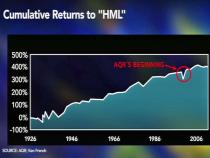Most Mom-And-Pop Investors Don't Understand The Difference Between Mutual Funds And ETFs

REUTERS/Robert Galbraith
FA Insights is a daily newsletter from Business Insider that delivers the top news and commentary for financial advisors.
When It Comes To ETFS Many Investors Want To Go Back To The Basics (Vanguard)
A Vanguard-produced webcast on ETFs found that two-thirds of retail investors tuning in were doing so just to understand what ETFs — exchange-traded funds — are and how they are different from mutual funds. Vanguard thinks it's smart for advisors to go back to the basics. It's important for investors to understand the difference between an ETF and a mutual fund. Jim Rowley, a senior investment analyst in Vanguard Investment Strategy Group, pointed out two key differences.
"For all the similarities, it comes down to two main differences, and that is with a mutual fund investors transact directly with the mutual fund. And you might do that through a financial intermediary or some type of advisor. But you're really acquiring shares of a mutual fund directly whereas with an ETF, you trade those shares on an exchange; you acquire them with some other market participant.
"Now, the other difference being with a mutual fund, you get your trades executed at the net asset value at the end of the day, and with an ETF you get that at a traded market price."
American Investors Are Optimistic About U.S. Stocks But Might Be Overlooking Europe (Franklin Templeton)
Franklin Templeton’s 2014 Global Investor Sentiment Survey has found that 75% of American investors think U.S. stock performance will be up in 2014. But 40% intend to take on a more conservative investment strategy this year. American investors think that Asia will have the next-best returns in equities in 2014.
"American investors today may be overlooking investment opportunities in Europe," said David McSpadden of Franklin Templeton Investments. "Those overly focused on their home country or on avoiding market volatility can be severely limiting their opportunity set. History shows that winners rotate—the top-performing asset classes in any given year might be vastly different the next. In many cases, it’s market volatility that creates opportunities for active managers to successfully capitalize on mispriced securities around the world for investors’ benefit." The survey polled 11,113 investors in 22 countries.
The Momentum Stock Meltdown Has Exposed A Big Flaw In A Very Popular Investing Strategy (Business Insider)
The recent stock market sell-off led by high-growth momentum stocks could have "exposed a flaw in strategies that take passive investing too literally," writes Business Insider's Sam Ro. Passive investing refers to a type of investing that mirrors a market index. Rebalancing your portfolio is key to managing risk when certain sectors grow faster than others. "There’s an important lesson from the recent rout in momentum stocks," noted Joseph Paul of AllianceBernstein. "Investors who have bought into an index have also been buying into dream stocks, often unintentionally. As these stocks rose to excessive valuations, they automatically became a bigger part of the benchmark."
Advisors Are Increasingly Turning To Closed-End Funds (Aberdeen Asset Management)
A closed-end fund is an investment company that raises money through an IPO by issuing a fixed number of shares and is then listed like a stock. These funds aren't closed to new investors, but have a fixed number of shares that can be traded daily. A study from Aberdeen Asset Management shows that financial advisors are increasingly turning to these funds in their client portfolios. Sixty-nine percent of advisors surveyed by Abderdeen said they used closed-end funds in client portfolios, up from 63% in 2012, and 52% in 2011.
"Advisors are increasingly recognizing the potential benefits of closed-end funds; we believe, however, that among the greatest challenges to increasing investor demand for these products is a lack of knowledge and understanding of the potential benefits of closed-end fund," Alan Goodson, Head of Product - U.S. for Aberdeen said in a press release. The study was commissioned by Aberdeen, which offers these products through Fund Consultants, an independent consulting firm.
Cliff Asness On The Basic Investing Strategy That's Made Him One Of The Most Successful Investors (Bloomberg TV)
Hedge-fund manager Cliff Asness thinks investors should consider the HML — high minus low — trading strategy which involves going long a portfolio of cheap stocks and short a portfolio of expensive stocks. The idea being that cheap stocks outperform expensive ones over time. But Asness told Bloomberg TV that investors should remember two key things about this:
1. He would be long cheap and short expensive. "I would do that in stocks, I would do that in stocks around the world, I would do that when it came to countries, when it came to bonds and when it came to currencies."
2. That strategy can look too good. But it's important to remember it doesn't always work. "If you went long cheap and short expensive, 1999 was not the year to do it. So the other thing you should take away from this chart is this is a pretty good thing to have as part of your portfolio but it does not always work, 'cause nothing does. It should be part of your portfolio — you should look to add that, diversify it with other things, it's not an arbitrage."
Screenshot via Bloomberg TV
More From Business Insider

 Yahoo News
Yahoo News 

